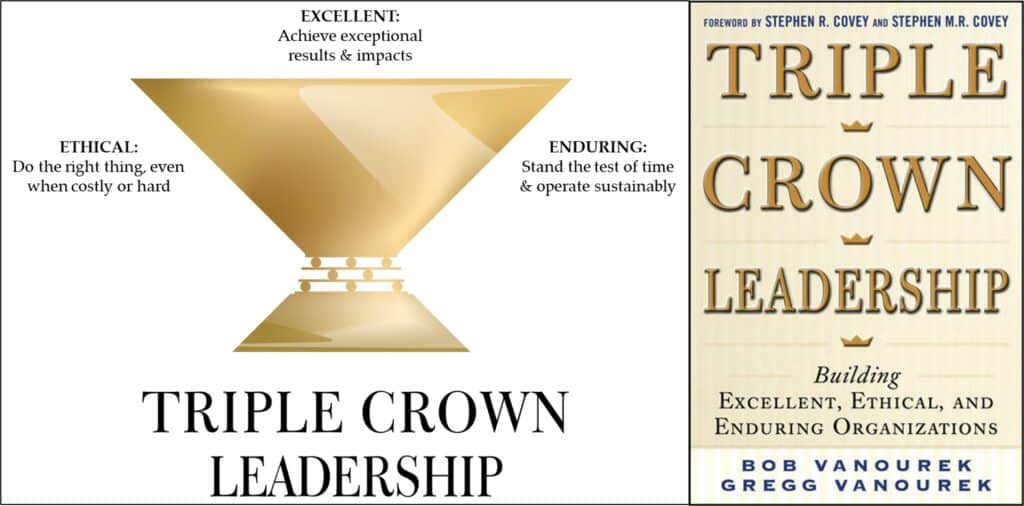It’s one thing to achieve outstanding results. It’s another thing to do so ethically, especially when others are cutting corners. Operating ethically is the second imperative of what we call “triple crown leadership” (excellent, ethical, and enduring).
To us, “ethical” means acting in accordance with accepted principles of right and wrong: acting with integrity. Leaders must pay attention to how results are achieved. Triple crown leaders insist on doing the right thing, even when it’s costly or hard.
All leaders confront ethical challenges and dilemmas. Many people take ethical leadership for granted. While they have sophisticated financial spreadsheets and multifaceted strategies, they may oversimplify ethics as merely upholding the law or avoiding lying and cheating.
If only it were that simple. It takes proactive leadership to instill and enforce ethical behavior in an organization.
Ethical Letdowns
Most ethical letdowns occur because there is pain or discomfort involved with ethical behavior. People feel pressure or fear, and they rationalize unethical decisions to avoid pain. For example, people can rationalize lying to others to avoid hurting them. They can accept, ignore, or pretend not to notice ethical violations—or make only halfhearted objections. That way, they can avoid being mocked or pegged as disloyal, which might threaten their job security or social standing.
The ethical path is often the harder one, yet we have brains wired to rationalize behavior that protects us from pain, conflict, and standing out from the group. Ethical fortitude relies heavily on courage to face adversity and social pressure, sometimes as a “voice of one.”
But courage is not enough. Sometimes, ethical dilemmas arise that require not only courage and character but judgment.
We’re all flawed. Since we all make mistakes, we’re wise to solicit help and input from others as sounding boards and accountability agents. Heated debates occur among reasonable people who can disagree on what is ethical. Such debates can be healthy and help maintain the ethical imperative, in the process building a culture of character in the organization.
Triple crown leaders make ethical decisions after analysis, reflection, and consultation with colleagues and confidantes. It helps to apply simple standards such as:
Would this violate any of my core beliefs?
Can I live with this on my conscience?
How would I feel if this were on the front page of the newspaper?
What would my family say about this decision?
It also helps to analyze the situation from the perspective of all the relevant stakeholders and brainstorm alternative responses—holding out for a good solution and refusing to settle.
Warning: You May Not Be as Ethical as You Think
People generally consider themselves ethical, but researchers have shown that people overrate their own ethical fortitude and are surprisingly good at rationalizing unethical behavior.
Leaders should begin with an explicit and firm commitment to ethical practices. Next, they must create systems and processes for instilling ethics into the enterprise.
Triple crown leadership begins with aspiring to excellent results and impacts. Next it ensures that those results are achieved ethically. Then the question arises: For how long? Can this be sustained?
(Check out our book, Triple Crown Leadership, to learn the five advanced leadership practices for building excellent, ethical, and enduring organizations and teams.)

Tools for You
- Leadership Derailers Assessment to help you identify what’s inhibiting your leadership effectiveness
- Personal Values Exercise to help you determine and clarify what’s most important to you
- Alignment Scorecard to help you assess your organization’s level of alignment

Leadership Derailers Assessment
Take this assessment to identify what’s inhibiting your leadership effectiveness. It will help you develop self-awareness and identify ways to improve your leadership.
Related Articles
- What’s Your Leadership Quest?
- Leadership and the Excellence Imperative
- Leadership for the Long Haul—The Endurance Imperative
- The Triple Crown of Leadership
- Business Ethics: How Are Today’s Companies Doing?
- Ethical Leaders: What They Do that Others Don’t
- 3 Things Ethical Leaders Ask and Say
- How to Prioritize Ethics When Leading People
- Ethical Leadership: Our Gamechanger
- The Root Cause of Ethical Failings (and Our Political Dysfunction)
- The Problem of Bad Leaders—and Why People Keep Following Them
- Ethical Decision-Making: Simple Tests for Leaders
- The Ethical Challenges Faced by Leaders
- Ethical Pitfalls–You Will Be Tested
- 17 Steps to a Thriving Ethical Culture
- What’s So Hard about Ethics?
- The End of Leadership?
- Choose Your Friends and Colleagues Wisely
Postscript: Quotes on Leadership and the Ethics Imperative
- “Integrity is the most important characteristic of a leader, and one that he or she must be prepared to demonstrate again and again.” -Warren Bennis, leadership scholar and author
- “In every survey we’ve conducted, honesty is selected more often than any other leadership characteristic. Overall, it emerges as the single most important factor in the leader-constituent relationship…. First and foremost, people want a leader who is honest.” -James Kouzes and Barry Posner, The Leadership Challenge
- “In the absence of integrity, great leadership cannot exist, only egotistical pretenses of it. Integrity, emotional maturity, and great leadership are inseparable.” -Edward Morler
- “I look for three things in hiring people. The first is personal integrity, the second is intelligence, and the third is high energy level. But if you don’t have the first, the other two will kill you.” -Warren Buffett, CEO of Berkshire Hathaway

Triple Crown Leadership Newsletter
Join our community. Sign up now and get our monthly inspirations (new articles, announcements, opportunities, resources, and more). Welcome!
+++++++++++++++++++++++
Gregg Vanourek and Bob Vanourek are leadership practitioners, teachers, and award-winning authors (and son and father). They are co-authors of Triple Crown Leadership: Building Excellent, Ethical, and Enduring Organizations, a winner of the International Book Awards. Check out their Leadership Derailers Assessment or get their monthly newsletter. If you found value in this, please forward it to a friend. Every little bit helps!

